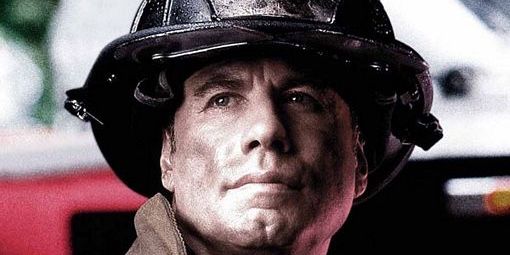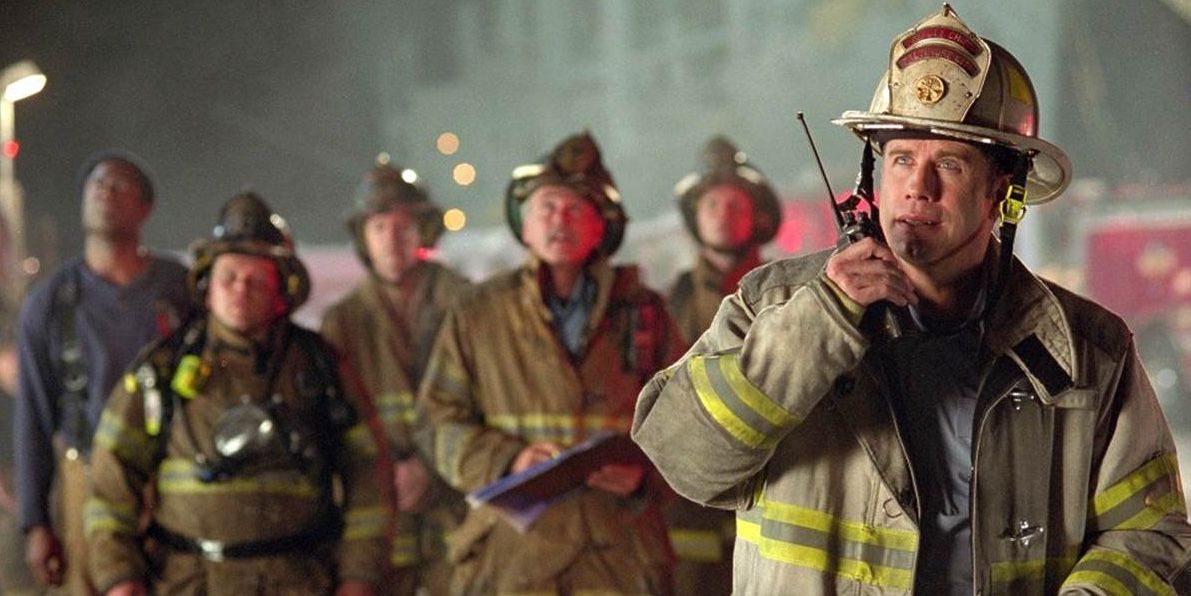This movie took an intriguing idea and ran it straight into the ground with a weak script and lousy direction. The clichés are so pervasive that it's sometimes hard to believe this movie was meant to be taken seriously. The heroic efforts of our firefighters deserve a much better showcase than this crapfest.
After seeing this movie, I decided to go back and look at the filmography of Joaquin Phoenix. I wanted to pinpoint the last time I thought he played a role effectively in a movie. As it turned out, the movie was To Die For, released in 1995. Granted, I haven't seen every movie in which he has starred since 1995, but it seems to me that his best performances are smaller roles that have top-notch directors presiding over them. As his Hollywood star grows ever bigger and his roles increase in size, I don't find the quality of his performances growing with them. If anything, it's the opposite. After seeing The Village last year, I thought he had hit a new low, but sadly, his performance in Ladder 49 was even worse.
Even though John Travolta is featured prominently in most of the poster and TV ads for the movie, the vast majority of it focuses on Jack Morrison (played by Joaquin Phoenix). Set in present-day Baltimore, Maryland, the movie starts out with Jack trying to rescue a victim from a burning building, when the floor collapses under him and he falls into the building. The rest of the movie consists of flashbacks of Jack's life throughout the past 10 years, interspersed with some scenes in the present time where Jack's colleagues are trying to find him and get him out of the building. At first, I liked the idea of doing flashbacks because it could help the audience really learn who the characters are. The problem is that director Jay Russell does a lousy job of tying those scenes into the overall story. It seemed like most of the flashback scenes were meant to emphasize the bond between the firefighters rather than develop characters, but even those scenes weren't done very well. How many scenes do we need to see with the firefighters getting drunk in a pub or playing pranks on each other? Okay, they're bestest buddy pals; we get it. It's hard to believe this movie was written by Lewis Colick, the same guy who wrote the screenplay for the excellent October Sky.
Ironically, one of the biggest clichés in the movie is how Jack meets his soulmate, Linda (played by Jacinda Barrett). He and his best friend/coworker Dennis (played by Billy Burke) meet Linda and a friend of hers in a grocery store. Okay, quick show of hands. How many people met their significant other in a grocery store? Oh, not so unusual? Well, what if I told you that Jack and Dennis lied to Linda and her friend about their ranks in the fire department? Call me crazy, but if I were trying to meet a complete stranger in a grocery store and she caught me in even a small lie, I would think a restraining order would be more realistic than a romantic dinner. But in the very next scene, Jack and Linda are having a romantic dinner. Before you can say "bad movie cliché," Jack and Linda are married. A little while later, the boys are in a pub, and Linda is with them. Despite the fact that she regularly drinks, she refuses a beer that's offered to her. Wanna guess why? And one of the most groan-inducing moments is when all the guys sing along to the Ohio Players song "Fire." I guess when you're a firefighter, anything that doesn't somehow involve fire — even in your personal life — is verboten.
When Jack first starts out at the fire station, he's a wide-eyed, aw-shucks kid who looks exactly the same as he does in the beginning of the movie, even though he's supposedly 10 years younger in that scene. Obviously, everyone is obliged to treat him like an outsider and give him a hard time as the mandatory initiation into their self-imposed fraternity. When Jack first meets Captain Mike Kennedy (played by John Travolta), the captain is half-asleep and he is not wearing his pants. (I'm pretty sure that would violate some sort of fire department policy in real life.) Naturally, Jack "passes" the initiation and becomes one of the guys, but despite all the camaraderie, you need at least one jerk among the sweetie-pies for sake of variation. That sad task falls upon Robert Patrick, who plays Lenny. (What happened to his career anyway?) Despite a few roadblocks in the relationship, do Lenny and Jack end up at least respecting each other? You get three guesses.
Oh, but life isn't all champagne and soda crackers for Jack. His life can be really tough. His wife has a hard time dealing with the fact that he has such a risky job. Several of his coworkers are injured or killed over the years, forcing him to wonder if he should be doing something a little less risky. After the flashback sequences are mercifully over and the movie concentrates more on the present-day dilemma of Jack having fallen through the floor, things start to get a little more interesting. The problem is that there are only two possible outcomes: Either Jack is alive at the end of the movie, or he's not. I won't reveal which one it is, but I will say that the ending feels like it was stamped with a cookie cutter. As with the rest of the movie, there is nothing original or even mildly groundbreaking about the ending.
Overall, Ladder 49 is a disjointed mess, and it's hard to figure out what point it's trying to make. Is it trying to say that firefighters are heroes? Absolutely, but we already knew that. It needs to say something more, but it doesn't. Given my tepid reaction to the trailer, I wasn't expecting it to be the Citizen Kane of firefighter movies, but I wasn't expecting it to be this bad either. I have great respect for our firefighters; they deserve a high-quality movie that allows audiences to see and feel the reality of the heroic work they do. Ladder 49 is not that movie.


